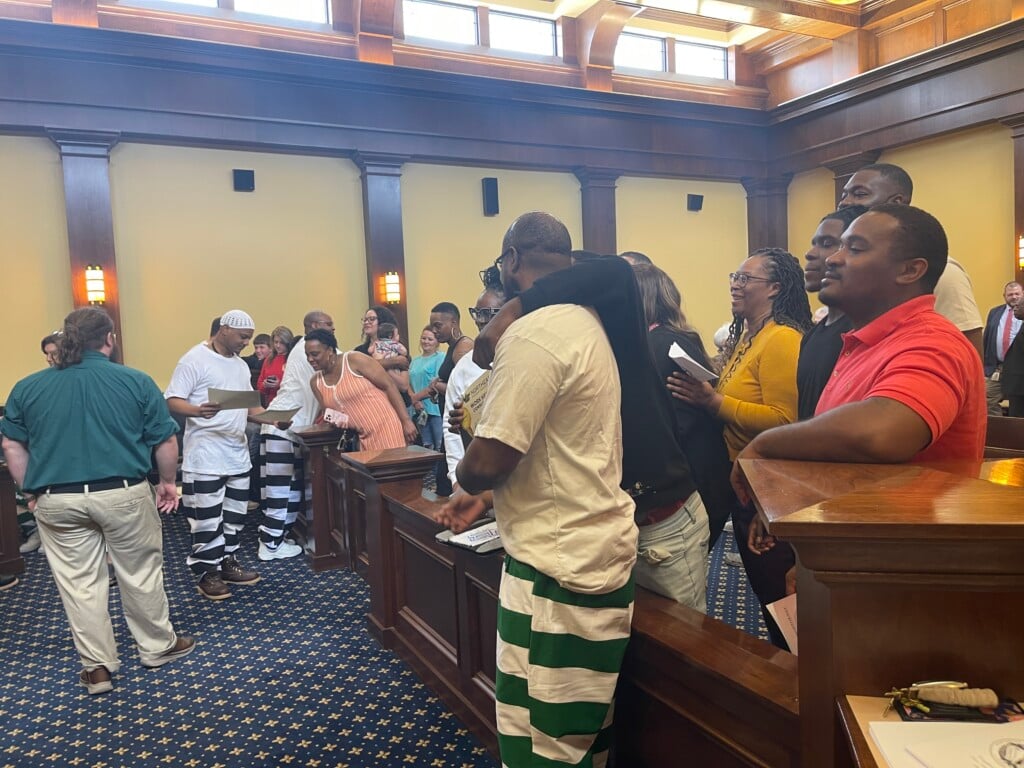Bryant Signs Court, Prison Reforms
JACKSON (Press Release) — Gov. Phil Bryant today signed into law House Bill 585, a comprehensive criminal justice reform package that protects public safety, reigns in corrections costs and restores clarity to Mississippi’s criminal sentencing guidelines. The legislation is the result of a months-long bipartisan effort to address corrections reform and puts Mississippi at the forefront of states that are reshaping their criminal justice systems through data-driven, research-tested policies.
“We pledged to Mississippians that we would make this the ‘public safety session’, and we have worked hard to develop this ‘Right on Crime’ research-based plan that is tough on crime while using resources wisely where they make the most impact. As a former law enforcement officer, I have no tolerance for career criminals or violent offenders, and this legislation will allow Mississippi the resources to hold these offenders accountable,” Gov. Phil Bryant said. “I thank Lt. Gov. Reeves, Speaker Gunn, the Legislature, judges and justices, the task force and all of the stakeholders who had a part in this effort. I will continue to work with law enforcement officials to ensure the strength of Mississippi’s criminal justice policies.”
The bill emerged from an exhaustive audit of Mississippi’s corrections and sentencing systems by a bipartisan task force chaired by Corrections Commissioner Christopher Epps.
The reforms included in the bill will avert projected prison growth over the next ten years and are expected to save the state at least $266 million in prison costs over the coming decade.
“The growing cost of corrections is unsustainable for Mississippi taxpayers,” Lieutenant Governor Tate Reeves said. “Our goal with this legislation is to rein those costs in while continuing to protect the public from violent offenders.”
“HB 585 is the single largest improvement to Mississippi’s criminal justice system in a generation,” Speaker of the House Philip Gunn said. “The recommendations made by the task force are truly transformative and bode well for the future of Mississippi. I applaud the work of everyone involved in this legislation – Task Force members, legislators, judges and justices, and stakeholders from across our state – for their dedication to this successful process. This was a huge undertaking.”
The legislation will focus expensive prison beds on serious and career offenders while strengthening community supervision and other sanctions for less serious offenders. It also provides a uniform definition of “crime of violence” for the first time ever and requires offenders convicted of a violent crimes to serve at least 50 percent of the sentence imposed by the court. It also creates targeted drug offense and property crime penalties that require tougher sentencing for serious offenders.
In addition, the legislation:
Restores certainty and clarity to Mississippi’s sentencing system by establishing minimum percentages of sentences that inmates must serve before becoming eligible for release;
Expands judicial discretion to impose research-proven alternatives to incarceration;
Creates statewide standards for drug courts and establishes a veterans’ court system and;
Ensures the quality and sustainability of the reforms by creating an oversight council and requiring the tracking of outcomes.
“Prisons are necessary for serious and violent offenders, but the research tells us that they are not the best option for every offender,” said Chief Justice William Waller. “HB 585 will deliver better public safety outcomes by expanding research-proven alternatives to incarceration, such as drug courts and rigorous drug treatment programs, as well as enhancing our reentry efforts to ensure offenders leave prison with the support they need to get their lives back on track.”
HB 585 encompasses 19 recommendations unanimously forwarded to the Mississippi Legislature last year by the bipartisan, inter-branch Corrections and Criminal Justice Task Force. The 21-member Task Force, comprised of legislators, prosecutors, judges, law enforcement officials, and others in the field, scrutinized Mississippi’s criminal justice system from top to bottom, analyzing data and consulting with a wide-ranging group of experts and stakeholders.





Leave a Reply